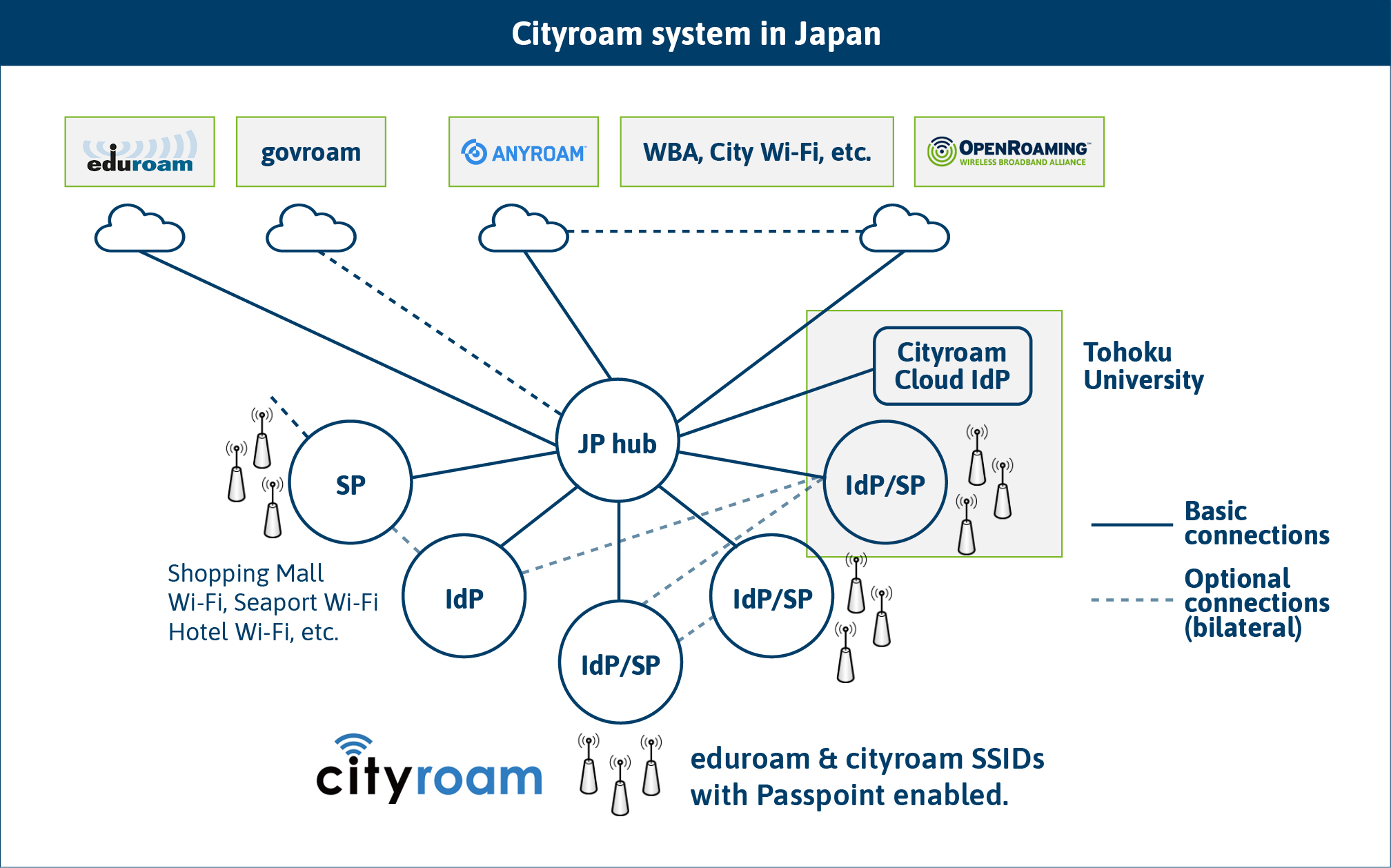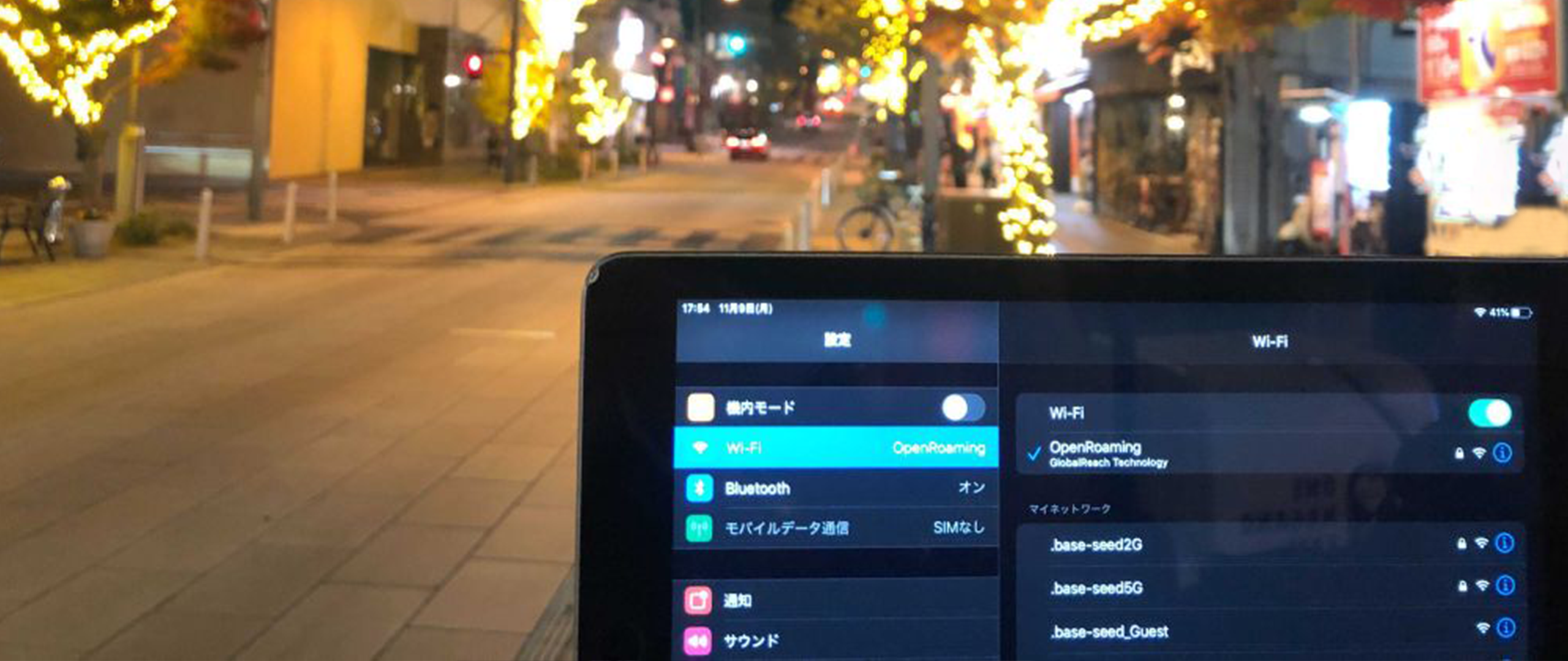
Cityroam Joins WBA OpenRoaming for Secure Wi-Fi
Cityroam completed the trial of OpenRoaming in October and deployed the services at various places throughout Japan, particularly in Kyoto City and Nagano City.
Cityroam is one of the pioneers of Passpoint adoption and OpenRoaming as an Implementer member. The organization is keen to help operators develop new businesses, technologies, and ecosystems with the adoption of OpenRoaming and extend their support to major telecom companies and ISPs so that they will be able to begin roaming services and serve more customers.
WBA provides Cityroam with the necessary assets to maintain the OpenRoaming service, including a Unique Organization Identifier (WBAID) and standard roaming code, which together enable access to global identity providers.
Based on the OpenRoaming Federation standard, identity providers, including telecom operators and ISPs from all over the world, can issue password profiles to their customers and provide Wi-Fi roaming services. The users can now go to Japan and enjoy the easy and secure public Wi-Fi seamlessly at the Cityroam service venues.
“I believe the simplicity of Cityroam’s architecture will contribute to quicker adoption and higher scalability, just as we saw in eduroam,” says Dr. Hideaki Goto, Project Leader and Executive Secretary of Cityroam, who was hosted at Tohoku University. “Cityroam will continue to seek out more opportunities for both settlement-free and settled roaming with operators worldwide in the future to allow more customers to enjoy the OpenRoaming services.”
Challenges and Opportunities
In Japan, Wi-Fi roaming used to exist within commercial public Wi-Fi, but the deployment cost is high for Wi-Fi operators. Cityroam and eduroam aim to provide an affordable roaming platform for various roaming consortia and operators, such as small and midsized businesses (SMBs), cities, schools, etc., who are interested in integrating the eduroam roaming system for research and education institutions.
Conventional Free Wi-Fi systems are being questioned in general due to insecure open Wi-Fi. Since there has historically been a lack of standardized secure roaming platforms in Japan, it was difficult for operators, especially small ones, to introduce secure roaming services to public Wi-Fi.
Free Wireless LAN services, also known as “Free Wi-Fi,” have long been widely deployed all over the world for attracting tourists as well as shoppers. Most of the Free Wi-Fi available today is based on the combination of open Wi-Fi and a captive portal and can result in security problems such as eavesdropping and man-in-the-middle attacks.
Cityroam also faced a challenge in account issuing to end-users, but that could be resolved when there are more telecom operators and ISPs get on board with a common roaming system. Users will be able to access their existing accounts and roam between different networks. WBA OpenRoaming provides the perfect solution for addressing current challenges in Japan.
One of the key outcomes of the Cityroam development is the integration of eduroam with the WBA’s roaming system based on the Passpoint specification. WBA developed a new roaming standard that brings higher security and usability to Public/Free Wi-Fi services, which has been implemented as OpenRoaming. Cityroam developed a secure roaming testbed system in Japan and started the roaming service, which was a pilot of secure Public Wi-Fi with international roaming capabilities.
Since Cityroam is based on the eduroam-integrated architecture, all eduroam users can roam and get on the network without any configuration changes on their devices.
Dr. Goto said he believed that OpenRoaming was the ideal medium that would provide many roaming opportunities for operators around the world by reducing complicated bilateral agreements and would enable Cityroam to expand its service footprints around the world.
“We are pleased to see the WBA partnership with Cityroam coming to fruition with the OpenRoamingTM roll-out in Japan, leveraging the standard developed on the different WBA Work Groups,”, says Tiago Rodrigues, CEO of WBA. “We salute Cityroam for making this service available to global identity providers who aim to extend their international footprints as part of the WBA OpenRoaming Federation.”
How Does OpenRoaming Work with Cityroam?
“Many venue owners say they are more interested in eduroam when comparing it with the ‘security’ of Wi-Fi. Since a large number of students and staff in more than 100 countries/economies already have an account, off-campus eduroam service has clearer value propositions for venue owners compared with the `security’ of Wi-Fi,” says Dr. Goto. “Of course, security is very important in next generation Wi-Fi, and operators should promote secure Public Wi-Fi. In addition, there is a high expectation for international Wi-Fi roaming in the tourism industry.”
There are some different approaches in eduroam adoption when compared to OpenRoaming. Operators should base their choice depending on their skills and/or business models. The most preferred is to add the eduroam SSID to the access points, which all eduroam users can quickly benefit from. Another approach is to let eduroam users install Passpoint profiles on their devices for getting on the network via OpenRoaming.
One of the key responsibilities of the operators is to ensure they are providing secure systems to protect users from malicious activities while connected to Wi-Fi and Wi-Fi Roaming. OpenRoaming promised to be a great platform for securing the network roaming.
User registration for Public Wi-Fi used to be cumbersome. With OpenRoaming, the users will be freed from on-site user registrations at various places they visit. Enterprises, cities, shops, cafes, and even schools will be able to deploy secure Wi-Fi with roaming much easier thanks to the common system design.
What is OpenRoaming?
WBA OpenRoaming is a roaming federation service enabling an automatic and secure Wi-Fi experience within a city, nationally and globally. With OpenRoaming we are creating an open connectivity framework for all organizations in the wireless ecosystem to power new opportunities with Wi-Fi in the 5G era. It encompasses three key elements:
Cloud federation
OpenRoaming creates a federation of networks and identity providers to enable automatic roaming and user onboarding on Wi-Fi. It is based on WBA’s Wireless Roaming Intermediary eXchange (WRIX) standards to scale and facilitate different business models under a harmonized framework.
Cyber security
OpenRoaming enables simple, secure and scalable Wi-Fi connections amongst different organizations that are part of the federation, allowing automatic and secure roaming between millions of networks with secured interconnection and encrypted communications.
Network automation
OpenRoaming defines an automated framework to support policy provision on devices and networks (Roaming consortium standard codes). Organizations that manage a Passpoint-enabled network may become part of the WBA OpenRoaming federation.
WBA OpenRoaming transforms the Wi-Fi experience for consumers and businesses while ultimately opening up opportunities for broadband and the Internet of Things (IoT) connectivity across numerous business verticals, including retail, hospitality, education, healthcare, automotive and aviation, among many others. Devices simply connect automatically and securely on to the OpenRoaming network with no passwords or further authentication needed.











